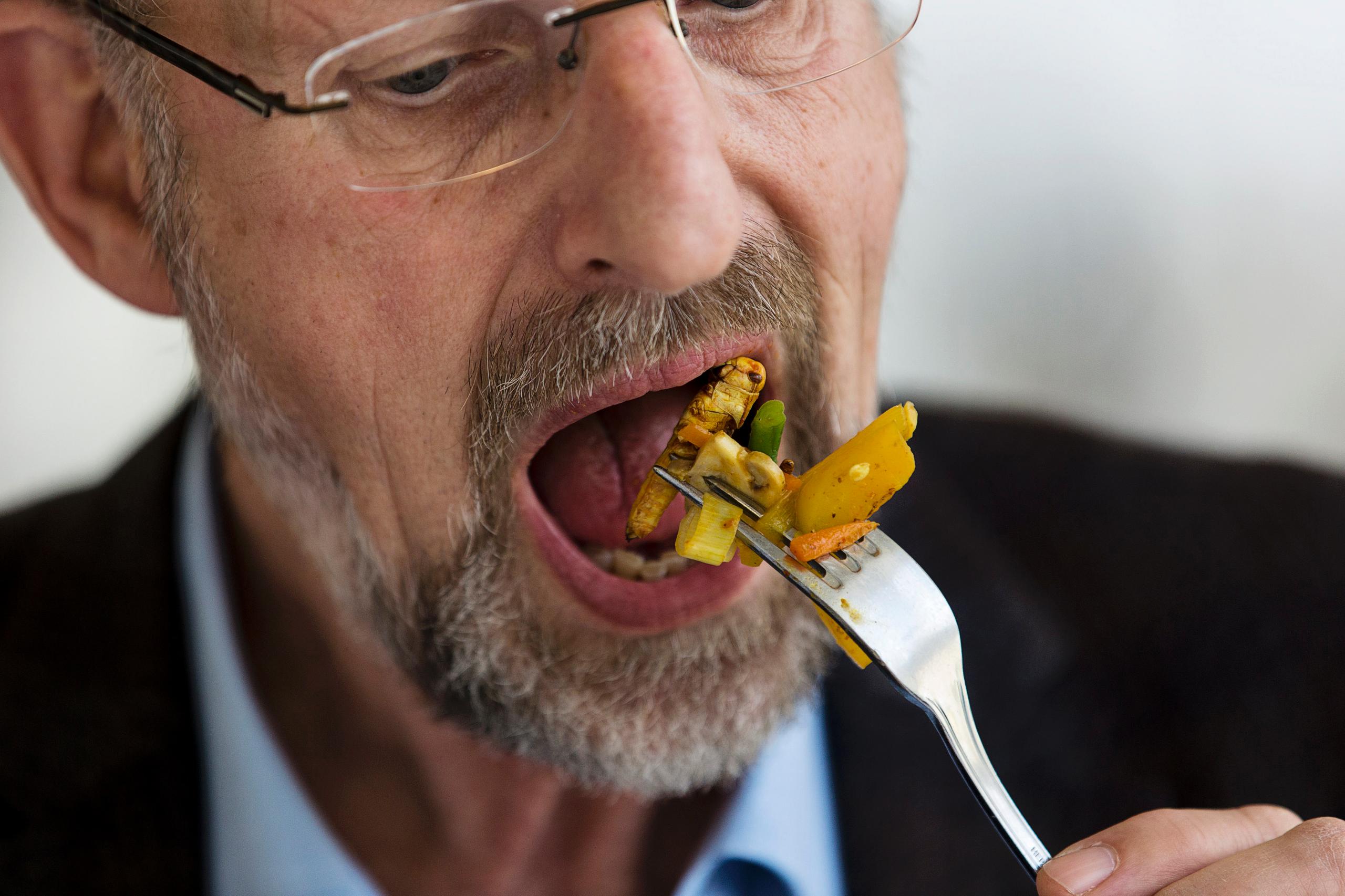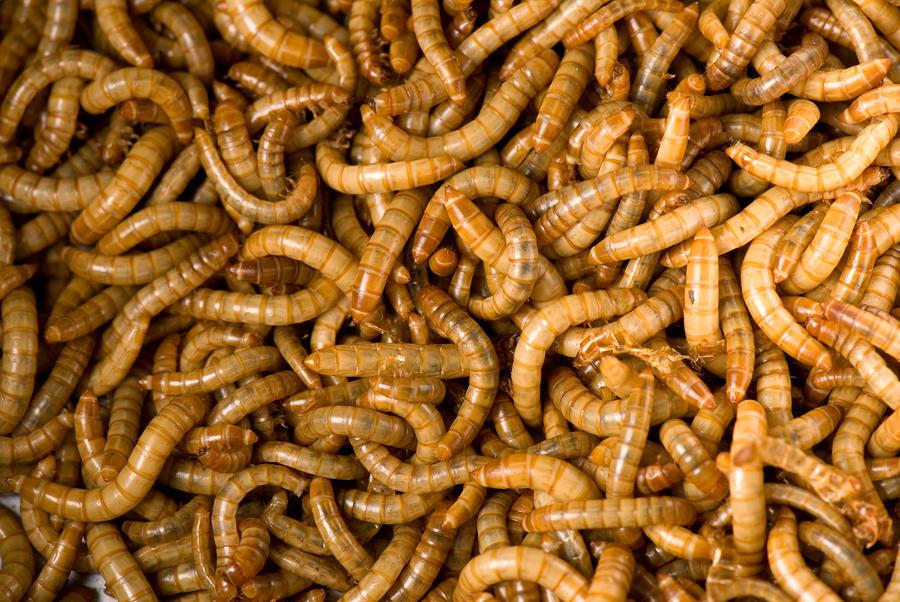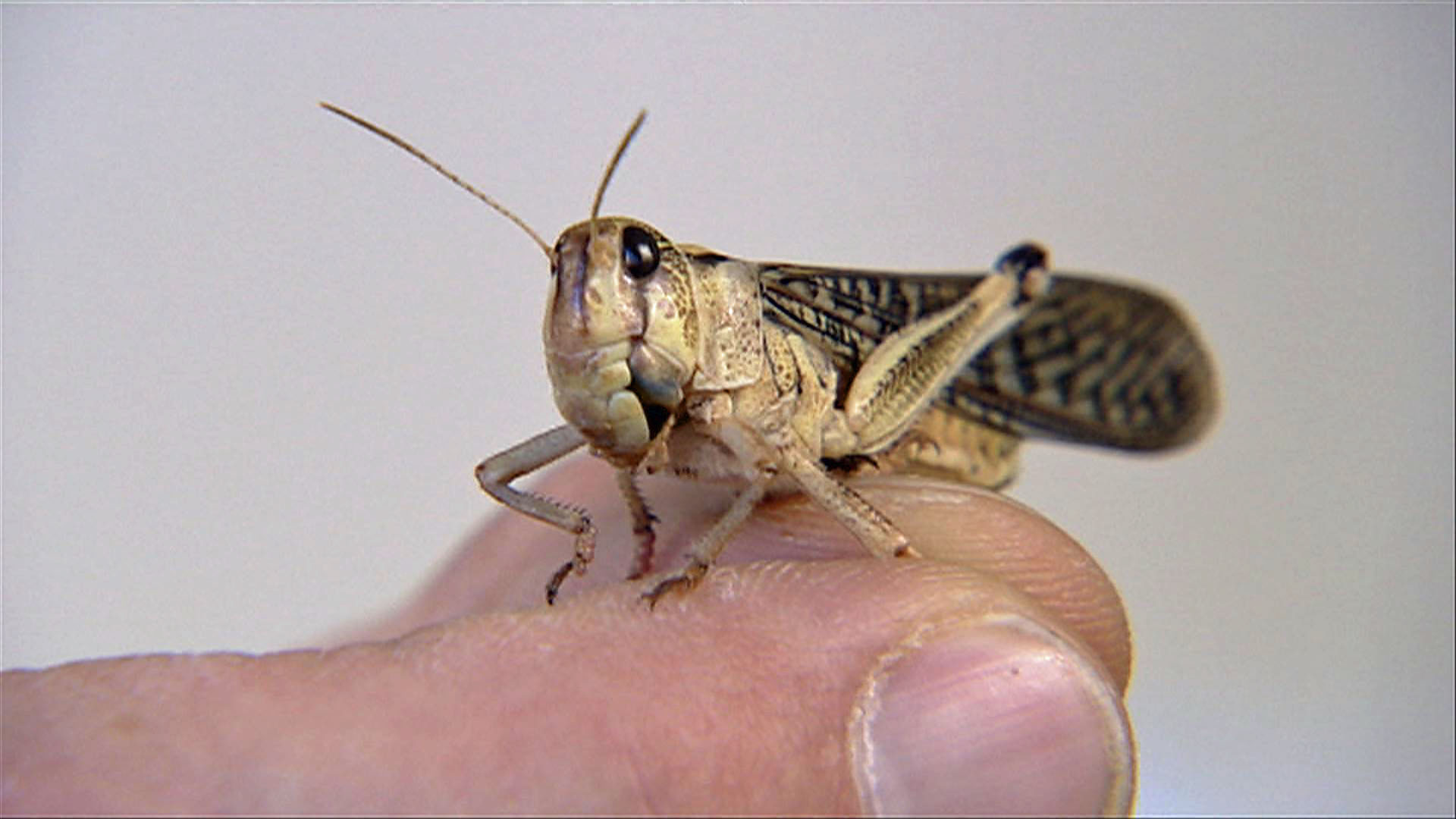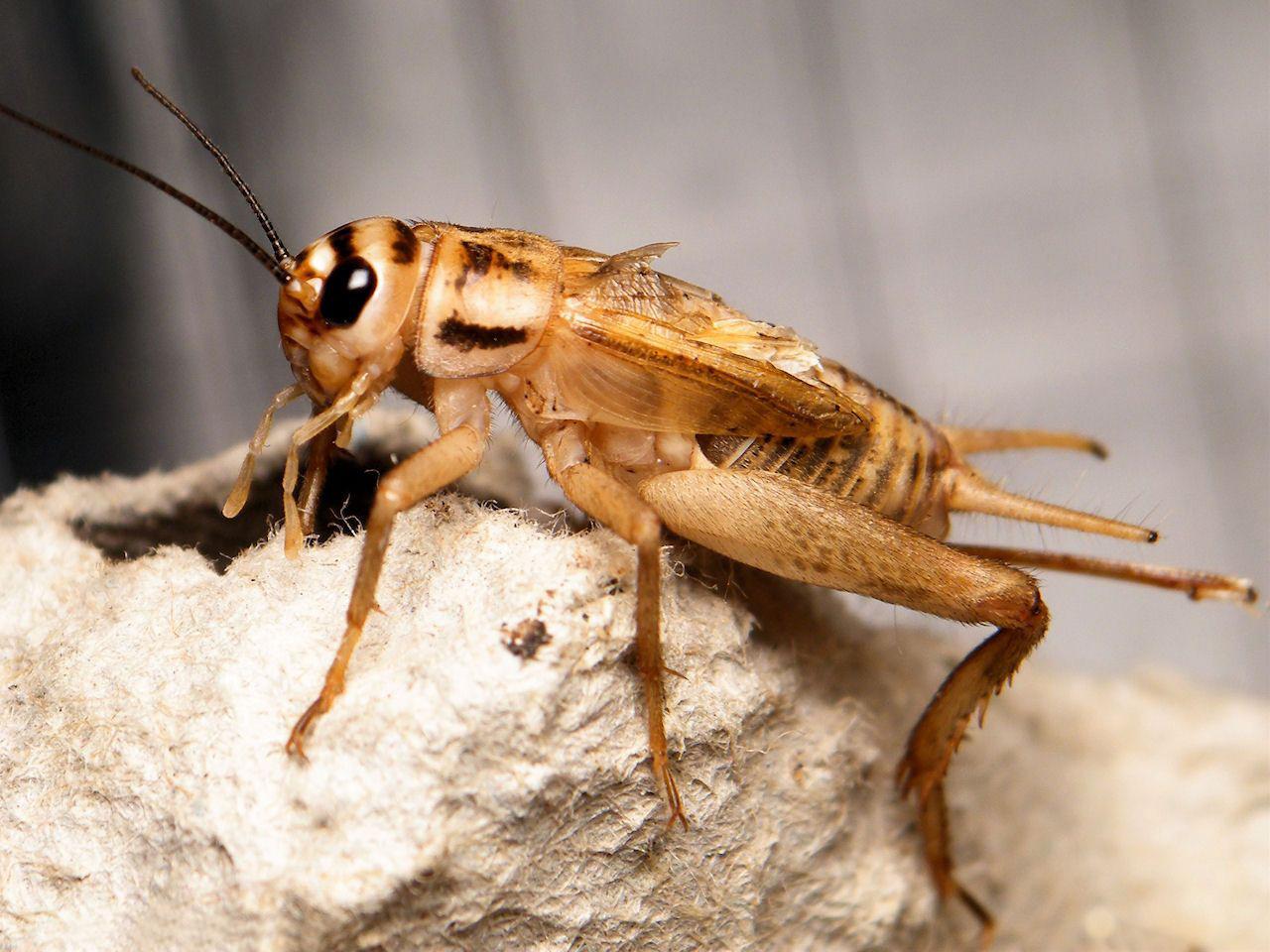
Creepy-crawlies conquer Swiss menus

Swiss retail outlets will be permitted to serve up and sell crickets, mealworms and locusts from 2016. Producers are already waiting in the wings. But there are still some issues to be resolved.
Hoping to take advantage of this change – the commercial sale of insects as foodstuff is currently banned – is Christian Bärtsch. We are in his office in a complex for social entrepreneurs and innovators, located under the arches of a rail viaduct in the trendy Zurich district Kreis 5.
There is nothing here to suggest that this could be from where the future of Swiss cuisine might emerge. But listening to this young man, you soon feel his passion for insects.
Bärtsch is one of the founders of EssentoExternal link, a start-up company that wants to produce food made of insects. The young entrepreneurs are convinced that their “delicious products will be on the shelves in three to four years’ time”.
“We have developed a burger made of mealworm larvae which doesn’t taste like a vegetarian or vegan burger, and a spread, a mealworm pâté. Plus chips, ravioli, pasta, bread. There are a huge number of ways of using these valuable ingredients,” he says. Unfortunately, he hasn’t got any samples to taste.
The social and ecological aspects and sustainability are important to his venture, stresses Bärtsch. For his company’s pilot breeding project in eastern Switzerland – which can’t be visited – the insects are fed with leftover grains from flour and muesli production. Liquid nutrition is produced from the waste of organic carrots, which cannot be otherwise used.

They are maintaining secrecy, but not because of animal rights concerns: animal rights advocates are very welcome, says Bärtsch, but because it is important “to ring-fence ourselves from competition”.
Breeding is not the start-up’s real interest but what comes afterwards, he adds.
The young entrepreneurs are putting the emphasis on the development, production and marketing of insect food products. The plan is to start with suppliers from other European countries because no one is advanced enough in Switzerland on the production side. They don’t want to adopt the kind of practices used in chicken farming, but will insist on high standards to ensure respectful treatment.
Urs Fanger has been breeding insects on an industrial scale for a long time. His company, EntomosExternal link, has produced insect petfood for six years, but has 27 years of experience in breeding large quantities for use in plant protection.
We could be ready very soon to produce insects as human nutrition, he says. “We are set to go.”
The lobbyist
A liberal Green party lawmaker from Canton Vaud, Isabelle ChevalleyExternal link, has been campaigning in parliament for insects to be allowed on Swiss plates. She has launched several parliamentary initiatives on the issue.
“Why is it forbidden in Switzerland to sell insects that are eaten in other countries?” she asked in her most recent parliamentary questionExternal link.
She ate insects for the first time in Burkina Faso when she visited a centre for street children in Ouagadougou, she writes from the Comoros islands, where she is currently travelling on business.
“The children invited me to share their lunch. They were eating grilled caterpillars from a shea tree, so I had some. It tasted very good.”

More
Swiss politicians try out insect buffet
Similar pleasures should soon be allowed on a broader scale in Switzerland, after parliament agreed to amend the food law. This means mealworms, crickets and locusts will be permitted foodstuffs.
A consultation periodExternal link on commercialising the consumption of insects is running until October.
Why have insects been added? “Until now, there have been all health concerns,” wrote the Federal Food Safety and Veterinary Office in response to questions from swissinfo.ch. There is now evidence of “positive experiences” with these three species of insects, so they are judged “suitable for consumption.”
Whether and exactly when insects will be permitted for consumption depends on the consultation. The food safety office expects that the regulations could take effect in the first half of 2016.
At the moment, a comprehensive risk analysis is underway. “There could still be changes or adjustments,” the food safety office added. It is examining all available data about the risks and side-effects involved in eating insects.
According to Evelyn Kirchsteiger-Meier, head of the department of quality management and food law at the Zurich University of Applied Sciences, the food safety office is looking, among other things, at a risk analysis by the Belgian authorities.

This report outlined four potential sources of danger, Kirchsteiger-Meier said: pathogenic microbes, chemical dangers, potential allergies and physical risks. Microbes and spores could affect insects during breeding, which means “a level of heat must be applied to ensure the microbiological safety of the insects,” the food safety expert says.
Insects can also use toxins as a defence mechanism. People who are allergic to shellfish may also have a reaction to insects. And when it comes to eating insects whole, extremities or wings could injure consumers.
The food safety office notes in its explanation on the new regulation that insects must be frozen and heated before delivery because they are potential carriers of parasites and disease-causing microbes.
In addition, they must be recognisable as insects, so not processed. “This is to protect consumers from fraud, because the consumer expectations in our culture are that insects are viewed as pests.”
The insect lobby do not agree with this last point, after a study showed that acceptance of processed insect products in Switzerland would actually be considerably higher.
That is one reason why Essento is planning to enter the market with primarily processed products.
Bärtsch chooses his words carefully when criticising the draft law: “The field is still open,” he stresses. “We are working hard with various players on proposals to change it.”
It is also the producers’ interest to ensure that customers know if a processed product has insects in it, he says. “So we are in close contact with the Swiss Consumer Protection FoundationExternal link. They are in principle open,” he says. Currently under discussion is a declaration or description of origin.
Chevalley is satisfied with the regulation, as far as it goes. But she finds the list of edible insects too short. Together with her lobbying group she wants to build an umbrella organisation for all organisations and businesses “with an interest in this production to define criteria for breeding, slaughter and hygiene”.
When it comes to home consumption, everyone is free to dish up insects on their tables on private occasions. These are not subject to the food laws, the food safety office writesExternal link. Bon appetit.
According to a study by Bern researchersExternal link, interest among Swiss consumers for eating insects remains low.
The School of Agricultural, Forest and Food Sciences of the Bern University of Applied Sciences asked 548 people by telephone, picked by random from German and French-speaking Switzerland about whether they would eat insects.
In terms of reasons to eat insects, they were convinced by the sustainability and health arguments. But they were not so prepared to actually eat them. Some 44% were disgusted at the idea. 16% said however they had already eaten insects, mostly out of curiosity. For a quarter of them, once was enough.
Those in the French-speaking part were more prepared to eat processed mealworms. Unprocessed insects were not popular in both language regions. Researchers therefore recommended those interested in selling insect products to, in a first step, offer products without insects that are recognizable in them.
As invertebrates, insects are not covered by the animal protection law. “That doesn’t mean that we shouldn’t have a respectful attitude towards them,” Sara Wehrli from Swiss Animal Protection told swissinfo.ch.
Temperature, humidity, substrates, the existence or non-existence of parasites or pathogens can play an important role, she said.
According to Wehrli, it is “certainly possible” that the animal protection law could one day be extended to cover insects. But this is likely to need experience with the mass production of edible insects first.
Translated from German by Catherine Hinkley

In compliance with the JTI standards
More: SWI swissinfo.ch certified by the Journalism Trust Initiative





























You can find an overview of ongoing debates with our journalists here . Please join us!
If you want to start a conversation about a topic raised in this article or want to report factual errors, email us at english@swissinfo.ch.